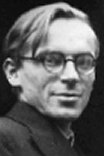Hugo Distler
Today, the brief moment of a musical genius. The University of Houston's College of Engineering presents this series about the machines that make our civilization run, and the people whose ingenuity created them.
As I listened to a piece by German composer Hugo Distler yesterday, it struck me how remarkable his music was. Distler wrote primarily for chorus and organ, and, if you know his work, you're aware of an utterly distinctive musical flavor.
 Distler was born in Nuremberg in 1908. His high-school years were those of the Weimar Republic and the intense flowering of high German culture that followed WW-I. He studied music at Leipzig Conservatory. The sound of hobnail boots was being heard in the streets of Bavaria, but the sound still seemed far away.
Distler was born in Nuremberg in 1908. His high-school years were those of the Weimar Republic and the intense flowering of high German culture that followed WW-I. He studied music at Leipzig Conservatory. The sound of hobnail boots was being heard in the streets of Bavaria, but the sound still seemed far away.
Just a few years later, Hitler came to power, and the great minds of that period began scattering out of Germany -- people like Albert Einstein, Theodore von Kármán, Paul Tillich, and Bruno Walter. Goebbels named composer Paul Hindemith a cultural Bolshevist and a spiritual non-Aryan in 1934. Hindemith wound up at Yale, Einstein at Princeton, and von Kármán at Cal Tech.
But Distler was only 25 when Hitler took over -- the newest musical talent of his age. He'd just been made head of the chamber music department at Lübeck Conservatory, and he was still too young to be a target. Yet he was driven by spiritual imperatives that cast a whole new light on traditional church music.
He brought the declamatory joy of baroque composers like Heinrich Schütz to the foursquare old melodies of the German Reformation. His music was quirky but beautiful, tonal yet chromatic. He made the old melodies dance with delight. It is a sound utterly unlike any other. Once you hear it, you don't forget it.
But it was a sound heard in the wrong place at the wrong time. A trip I took in 1978 reminds me of what Distler faced. A Polish colleague, driving me down the valley from Silesia to Krakow, stopped to show me Auschwitz. What a chamber of horrors! A sign on one wall explained how the exterminations were scheduled. Jews were allowed to starve for months as they waited their turn in the gas chambers. But clergy were rushed to the head of the line. They were considered too dangerous to keep around.
Suppressing the established German church was dicey business for the Nazis. But suppress it they would. Distler represented religious intensity the Nazis couldn't tolerate. They told him he was trouble and his music was degenerate. He would be taken from his church post and shipped off to the Wehrmacht! Conscientious objection was treason punishable by death, and Distler could never support the war. So, disillusioned and depressed, he put his head in his own gas oven and ended his life at the age of 34.
He lived not even as long as Mozart, and he worked in a far more hostile climate. His brilliance was a side road that never properly joined the mainstream of twentieth-century musical evolution. Music would not sound the same today if it had. I'll never forget my sense of pure surprise the first time I sang Distler.
I'm John Lienhard, at the University of Houston, where we're interested in the way inventive minds work.
(Theme music)
Neumann, K. L., Distler, Hugo. The New Grove Dictionary of Music and Musicians (Stanley Sadie, ed.). New York: MacMillan Publishers, Ltd., 1980, Vol. 5, pp. 497-499.
Gay, P., Weimar Culture: The Outsider as Insider. New York: Harper Torchbooks, 1968/1970.
Palmer, L., Hugo Distler and His Church Music. St. Louis: Conordia Pub. House, 1967.
See also, the Wikipedia page for Hugo Distler.
I am grateful to a number of UH colleagues for their help: David Ashley White, Music Department; Edward Lukasek, Library; and Sara Fishman, History Department.